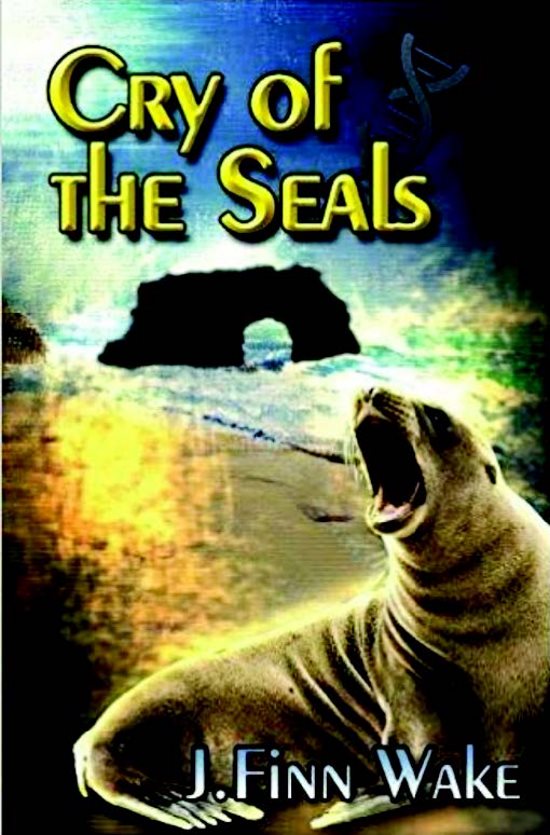| | Published December 25, 2018
| New novel delves into science of CRISPR Cas9 gene editing technique use
| | | By Sophie Braccini |  | | Photo provided |
Today's young adult audiences want realistic, challenging, dark and suspenseful storytelling. It is a trend that comes from adult literature, think of "The Reckoning" by John Grisham or "Dark Sacred Night" by Michael Connelly. Books such as "Thunderhead: Arc of a Scythe" by Neal Shusterman are not for timid hearts; and now, Lamorinda Weekly's own editor Jennifer Wake, who writes under the name J. Finn Wake, has published such a young adult novel: dark, mysterious, and thrilling. It is also a story born of the author's love of the sea and its inhabitants. As science fiction borders recent rogue science incidents, "Cry of the Seals" is a modern day fairy tale where the fairies are crossing the boundaries between the human and animal kingdom and the bad witches are picaroon scientists manipulating genes we fear could pop out for real any time.
 The story is set on the Pacific coast of Northern California. Two teens, quirky and brilliant 15-year-old Noah and his friend Taylor, a fearless girl, get tangled in a dark mystery that requires them to push both their intellectual and emotional boundaries.
The story is set on the Pacific coast of Northern California. Two teens, quirky and brilliant 15-year-old Noah and his friend Taylor, a fearless girl, get tangled in a dark mystery that requires them to push both their intellectual and emotional boundaries.
 Noah is different, and he is embarrassed by what is a little too "special" about him. He is not badly victimized at school, but bullying is never very far. He has few friends, but for Taylor, and Noah also has newly realized gifts, such the ability to hear and understand marine mammals. When Noah shares his perceptions and ideas with Taylor, it is enough for the adventurous girl to start a spiral of actions that they are unable to stop until complete resolution.
Noah is different, and he is embarrassed by what is a little too "special" about him. He is not badly victimized at school, but bullying is never very far. He has few friends, but for Taylor, and Noah also has newly realized gifts, such the ability to hear and understand marine mammals. When Noah shares his perceptions and ideas with Taylor, it is enough for the adventurous girl to start a spiral of actions that they are unable to stop until complete resolution.
 It is a classic story of good versus evil, where rogue scientists will stop at nothing to conquer recognition and fame. The interesting twist here is that just recently, such a scientist in China claimed to have edited a human genome and given twins genetic traits that will reproduce in future generations.
It is a classic story of good versus evil, where rogue scientists will stop at nothing to conquer recognition and fame. The interesting twist here is that just recently, such a scientist in China claimed to have edited a human genome and given twins genetic traits that will reproduce in future generations.
 Scientific aspects in the book involve genetic editing using CRISPR Cas9 (clustered regularly interspaced short palindromic repeats), the RNA-guided gene-editing platform that makes use of a bacterially derived protein (Cas9) and a synthetic guide RNA to introduce a double strand break at a specific location within the genome. Wake's description of this genetic editing technique will satisfy science-minded youth, but it is explained simply enough to make it accessible to all. Bottom-line: what the author uses as the base of her story is real science and the extrapolation she makes is, unfortunately, not impossible.
Scientific aspects in the book involve genetic editing using CRISPR Cas9 (clustered regularly interspaced short palindromic repeats), the RNA-guided gene-editing platform that makes use of a bacterially derived protein (Cas9) and a synthetic guide RNA to introduce a double strand break at a specific location within the genome. Wake's description of this genetic editing technique will satisfy science-minded youth, but it is explained simply enough to make it accessible to all. Bottom-line: what the author uses as the base of her story is real science and the extrapolation she makes is, unfortunately, not impossible.
 Besides the scientific backdrop, this is the story of youth overcoming differences, taking risk for a good cause and maturing in the process. Wake does not shy away from difficult ethical questions such as whether the ends justify the means, and parents who get the book for their child will enjoy reading it for all the good conversation topics that can come from it.
Besides the scientific backdrop, this is the story of youth overcoming differences, taking risk for a good cause and maturing in the process. Wake does not shy away from difficult ethical questions such as whether the ends justify the means, and parents who get the book for their child will enjoy reading it for all the good conversation topics that can come from it.
 "Cry of the Seals" is Wake's first novel. She has been a writer for years, contributing to regional magazines and newspapers. The characters are well developed and very credible. The ending might leave the reader wondering, as some questions go unanswered and others have found too quick of a denouement.
"Cry of the Seals" is Wake's first novel. She has been a writer for years, contributing to regional magazines and newspapers. The characters are well developed and very credible. The ending might leave the reader wondering, as some questions go unanswered and others have found too quick of a denouement.
 It is fair to say that about half of the readers for young adult literature are not that young anymore, and those interested in a good adventure, set on the edge of land and sea, and who are intrigued by what is possible with science today might also want to check out "Cry of the Seals."
It is fair to say that about half of the readers for young adult literature are not that young anymore, and those interested in a good adventure, set on the edge of land and sea, and who are intrigued by what is possible with science today might also want to check out "Cry of the Seals."
 The book can be found at Orinda Books, ordered through other book stores, and purchased online.
The book can be found at Orinda Books, ordered through other book stores, and purchased online.

|
| | | | | | | | | | | | |



